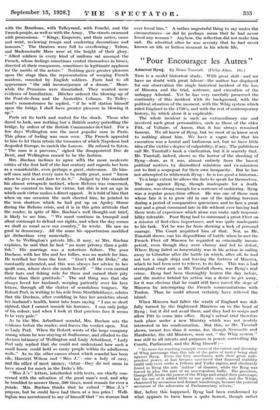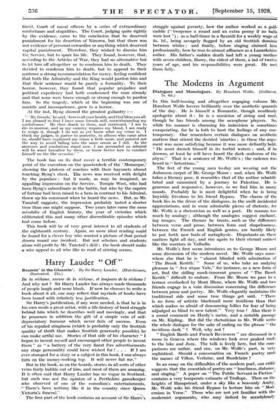" Pour Encourager les Autres "
Admiral Byng. By Brian Tunstall. (Philip Allan. 16s.) Tins is a model historical study. With great skill—and we have no doubt with great labour—the author has displayed for our observation the single historical incident of the loss of Minorca and the trial, sentence, and execution of the unhappy Admiral. Yet he has very carefully preserved the continuity of this incident with its background, with the political situation of the moment, with the Whig system which ruled England in the 1750's, and with the rest of contemporary history, by which alone it is explicable.
The whole incident is such an extraordinary one and involved such great personalities, such as those of the elder Pitt, of Voltaire, of Anson, that it has always remained famous. We all know of Byng, but we most of us know next to nothing about him. We have a vague idea that his execution was a brutal and barbarous act, but we have little idea of the victim's degree of culpability, if any. The publishers call Mr. Tunstall's book a vindication, but it is scarcely that. Mr. Tunstall, indeed, shows us the horror of the shooting of Byng—done, as it was, almost entirely from the basest political motives by discredited ministers and ex-ministers out to find a scapegoat for their own incapacity. But he has not attempted to whitewash Byng : he is too good a historian. To a large extent he allows the facts to speak for themselves.
The case against Byng, though inadequate for a death sentence, was strong enough for a sentence of cashiering. Byng was a regular peace-time officer. He was one of those men whose fate it is to grow old in one of the fighting Services during a period of comparative quiescence and to face a great war and a great command late in life without ever having had those tests of experience which alone can make such responsi- bility tolerable. Poor Byng had to command a great Fleet on a mission of first-class importance, and was quite inadequate to his task. Yet he was far from showing a lack of personal courage. The Court acquitted him of that. Nor, as Mr. Tunstall shows, can his dispositions of battle when he met the French Fleet off Minorca be regarded as criminally incom- petent, even though they were clumsy and led to defeat.
Where Byng failed so lamentably was in his action in sailing away to Gibraltar after the battle (in which, after all, he had not lost a single ship) and leaving the fortress of Minorca, which he had been sent to relieve, to its fate. This was a bad strategical error and, as Mr. Tunstall shows, was Byng's real crime. Byng had been thoroughly beaten the day before, and the motive behind his action was a desire to get away, for it was obvious that he could still have raised the siege of Minorca by interrupting the French communications with Toulon. Thus he could almost certainly have relieved the island.
When Minorca had fallen the wrath of England was skil- fully turned by the frightened Ministers on to the head of Byng ; but it did not avail them, and they had to resign and allow Pitt to come into office. Byng's actual trial therefore took place under a new Ministry which was not acutely interested in his condemnation. But this, as Mr. Tunstall shows, meant less than it seems, for, though Newcastle and Hardwicke, the old Ministers, were out, " the Whig system " was still to all intents and purposes in power, controlling the Courts, Parliament, and the King himself :- " No more far-reaching example exists of the extent and diversity of Whig patronage than this tale of the gates of mercy being shut against Byng. Even the City merchants, with their great inde- pendent power, at last became convinced that financial stability could only exist under a Pelham and Yorke regime, and obediently found in Byng the sole author' of disaster, while the King was forced to play the part of an unscrupulous bully. His grandson, George III, broke the power of the Whigs and seized their patronage, but his use of it added little to our public credit, and the Whigs, chastened by secessions and distant wanderings, became the political ancestors of the advocates of Parliamentary reform."
But, before this happened, Byng had been condemned by what appears to have been a quite honest, though rather timid, Court of naval officers by a aeries of extraordinary misfortunes and stupidities. The Court, judging, quite rightly by the evidence, came to the conclusion , that he deserved punishment for his desertion of Minorca, but that there was
not evidence of personal cowardice or anything which deserved capital punishment. Therefore, they wished to dismiss him the Service, but to spare his life. They found, however, that, according to the Articles of War, they had no alternative but to let him off altogether or to condemn him to death. They decided to condemn him to death, but to append to their sentence a strong recommendation for mercy, feeling confident that both the Admiralty and the King would pardon him and that their sentence would be purely a formality. To their horror, however, they found that popular prejudice and political expediency had both condemned the man already and that none were brave enough or strong enough to pardon him. So the tragedy, which at the beginning was one of muddle and incompetence, grew to a horror.
At the last, Byng showed the greatest gallantry :—
" My friends,' he said, here is all your health, and God bless you all. I am pleased to find I have some friends still, notwithstanding my ins' fortunes.' He then drank to them, and continued, I am to die to-morrow, and as my country requires my blood, I am ready to resign it, though I do not as yet know what my, crime is. ,I think my judges, in justice to posterity, to officers who come after us, should have explained my crime a little more, and pointed out the way to avoid falling into the same errors as I did. As the sentence and resolutions stand now, I am persuaded no admiral will be wiser hereafter by them, or know better how to conduct himself on the like occasion.' "
The book has on its dust cover a terrible contemporary print of the execution on the quarterdeck of the Monarque,' showing the platoon of marines with their bayonets almost touching Byng's chest. The news was received with delight by the populace ; but it made, as may be imagined, an appalling impression on the Service. Temple West, who had been Byng's subordinate in the battle, but who by the caprice of fortune had been raised to a hero in contrast to his Admiral, threw up his command when he heard the news. But, as Mr.
'I'unstall suggests, the impression probably lasted a shorter
.time than one might suppose. Two years later came the anno .mirabilis of English history, the year of victories which
,obliterated this and many other discreditable episodes which had come before.
This book will be of very great interest to all students of .the eighteenth century. Again, no more ideal reading could he found for a clever boy who wanted a picture of that period drawn round one incident. But not scholars and students .alone will profit by Mr. Tunstall's skill : the book should make
a wise appeal to all who like to read of stirring scenes.







































 Previous page
Previous page